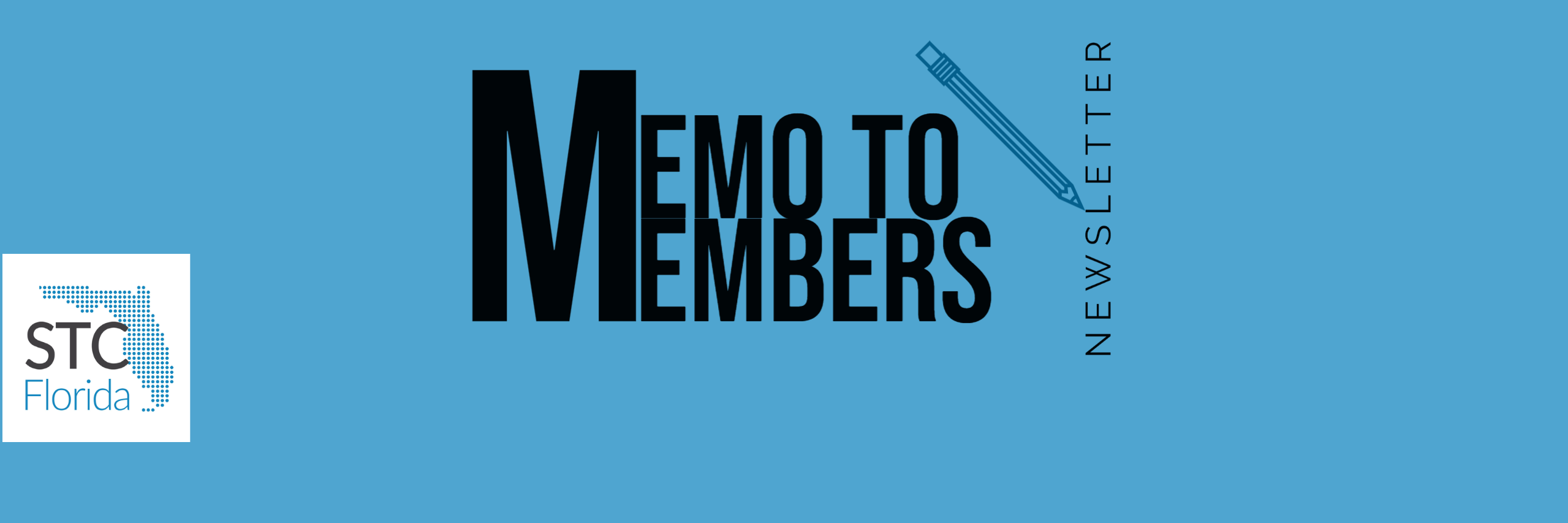Lessons from New Tech Comm Professionals
By: James Yunik
Student Member
Florida Chapter, STC
As we begin this new year and decade, it is fitting that we turn our attention toward new beginnings in the world of technical communication. The January meeting of the Society for Technical Communication (STC) was held on Thursday the 23rd at Perkins in Winter Park, and hosted a panel of five new tech comm professionals with tips and perspectives on entering and excelling within the field.
Panel Members:
- Winfield Pearson (employed by JHT Inc.)
- Shawn Menard (employed by JHT Inc.)
- Alexandra Engrand (employed by JHT Inc.)
- Emily Wells (employed by Lockheed Martin)
- Amy Truong (employed by JHT Inc.)
As a University of Central Florida (UCF) student and aspiring tech comm professional, here are the panelists’ points that stood out to me.
Job Hunting Strategies and Pointers
Expand your skillset and experience beyond writing. Augmenting your skillset with things like programming languages, desktop publishing software, or financial literacy gives you more to offer and—potentially—gives you the upper hand in a competitive market.
Don’t limit yourself to applying for jobs with “Technical Writer” in the job title! The skills you’ve developed in your education and life experience are useful in a variety of jobs and careers, especially in the wide field of technical communication. Read job descriptions and see where you might fit in.
Networking is an invaluable skill and habit that can help you jumpstart and maintain your career, especially when done in person. Joining professional groups (like STC!) and meeting with potential employers are great ways to learn about new opportunities and—just as importantly—make yourself known to those in the know.
Before meeting with a potential employer, read up on the organization as well as the role, and ask specific questions about both. Inquiring about nuances of the job, company culture, and policies shows that you are genuinely interested and invested in the opportunity. You’ll also learn more about possible directions for your life and career in the process. Also, don’t forget to follow-up on interviews with a thank you note or email!
Finally: don’t let rejection dampen your spirits. It’s literally impossible to win ‘em all.
The Benefits of Being New
For many companies, new professionals may represent much-needed change for their culture and knowledge base. Your status as a new recruit means you haven’t become rooted in outdated habits or modes of thinking, and it provides you with a license to learn. You can—and should—ask questions; doing so benefits both you and the company.
Tips on Starting Out
This may come as a surprise but as a technical writer, it is not unlikely that you won’t do much—or any—writing. Single-source publishing is gaining in popularity, so many companies are opting for programs like FrameMaker, Arbortext, and MadCap Flare. Consequently, knowledge of programming languages (like XML and HMTL) is increasingly valuable, and you may compile more documents than you compose.
Let go of the academic mentality of making a few revisions and forgetting your work once it’s graded. Within the professional world, the number of required revisions may be vastly greater and the revision timeline may be much longer!
Don’t be idle. Keep busy and write down everything you do in the course of your job. Records of your contributions are a valuable tool for self-advocacy. And since we’re on the topic…
It is crucially important that you advocate for yourself. Doing so not only means recording your contributions and keeping records of your communications, but also proactively representing your views and interests. It’s possible that others may advocate for you if you’re incredibly lucky, but luck is not a strategy. Don’t expect your future to fall into place; build it.
